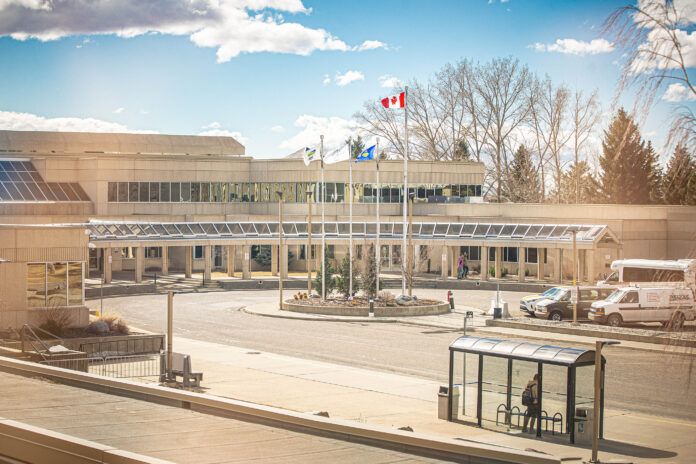An Indigenous eagle feather will soon be included in practice trial proceedings happening in Lethbridge Polytechnic’s courtroom.
Used by students in the School of Justice Studies and Police Cadet Training programs to learn protocols with documents or testifying, the classroom looks and feels like a real provincial courtroom with wood panels on the walls, a raised judge’s bench, a witness stand and podiums for the prosecutor and defence. Soon, this learning environment will also incorporate an eagle feather for the swearing of oaths.
“The eagle feather is significant for Indigenous people who are testifying on the witness stand,” explains Justice Studies instructor Gord Ryall. “In real courtrooms – provincial courts and the Court of King’s Bench – an eagle feather is provided and they swear to tell the truth on it as an alternative to religious texts such as the Bible or Koran. The eagle feather in our courtroom will represent the same level of significance for Indigenous students and police cadets.”
Ryall notes incorporating the eagle feather will help all Justice Studies students, Indigenous and non-Indigenous, recognize the importance of the various ways in which testimony can be given in a Canadian courtroom.
Lethbridge Polytechnic’s eagle feather was gifted to Ryall by former Indigenous Services Manager Lowell Yellowhorn.
“Gord has worked tirelessly to incorporate Indigenous practices into our courtroom,” says Trudi Mason, dean for the Centre for Justice and Human Services. “Not only to create an accurate representation of what future public safety officers will encounter in court, but to continue to demonstrate our institution’s commitment to truth and reconciliation.”
On Friday, Peter Weasel Moccasin, the polytechnic’s Blackfoot Grandfather will bless the eagle feather, as it becomes part of the courtroom’s swearing of oaths ceremony. A smudge will also be held prior to the blessing.







